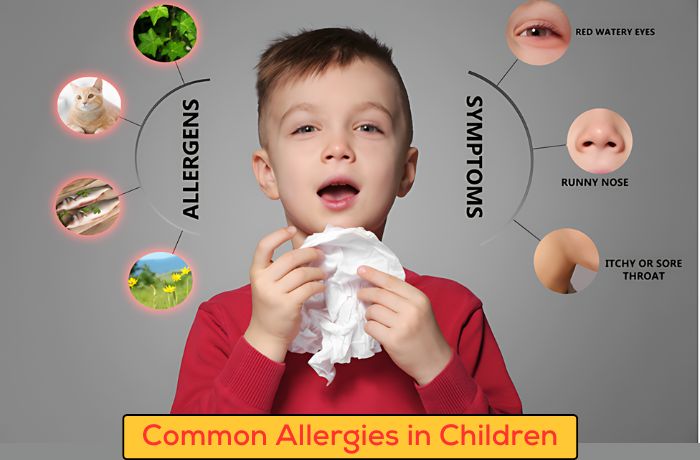Allergies in children are common and can cause discomfort and health problems if not managed properly. As a parent, it’s important to understand the signs and triggers so you can help your child avoid allergens and seek appropriate treatment. This guide is an explanation of the most common allergies in children, their symptoms, and what you can do to manage them.
What Are Allergies in Children?
Allergies occur when the immune system reacts to a normally harmless substance (allergen). In children, allergies can be triggered by things like pollen, dust, certain foods, and even pets. When your child is exposed to an allergen, the body sees it as a threat, causing symptoms such as itching, sneezing, and swelling.
What Causes Allergies in Children?
The exact cause isn’t always clear, but genetics play a role. If a parent has allergies, their child is more likely to have them. Other factors include environmental exposure to allergens early in life.
Types of Allergies in Children
Children can have different types of allergies. Let’s take a look at the most common ones.
1. Food allergies: Some children are allergic to certain foods, with milk, eggs, peanuts, and shellfish being the most common triggers. Symptoms include stomach pain, rashes or, in severe cases, anaphylaxis (a life-threatening reaction).
2. Environmental allergies: These are caused by environmental allergens such as pollen, mold, dust mites and cockroaches. Children with environmental allergies often suffer from sneezing, runny nose and itchy eyes.
3. Animal allergies: Some children are allergic to animals, especially cats and dogs. Pet dander (tiny flakes of skin) can cause sneezing, coughing and itchy skin.
4. Seasonal allergies: Also known as hay fever, this type of allergy is triggered by pollen from trees, grasses and weeds. Symptoms tend to be worse at certain times of the year, especially in spring and autumn.
Common Symptoms of Allergies in Children
Symptoms of allergies in children can vary depending on the type of allergy, but some of the most common symptoms include
- Skin reactions: Rashes, hives or eczema flares.
- Respiratory problems: Sneezing, coughing, runny nose or itchy eyes.
- Digestive problems: Vomiting, diarrhoea or stomach cramps after eating certain foods.
- Severe reactions: Rarely, some children may have anaphylaxis, a severe reaction that can cause difficulty breathing and requires immediate medical attention.
It’s important to be aware of when these symptoms occur as they can help you identify what is triggering your child’s allergies.
Common Triggers of Allergies in Children
Different children may be sensitive to different allergens. The most common triggers are
1. Food: Peanuts, milk, eggs, soya and shellfish are common triggers.
2. Pollen: From trees, grass and flowers, especially in spring and autumn.
3. Dust mites: Tiny bugs that live in carpets, bedding and furniture can cause allergic reactions in sensitive children.
4. Pets: Pet dander from animals such as cats and dogs can cause allergies.
5. Mould: Mould, found in damp areas such as bathrooms and basements, can cause respiratory allergies.
How to Identify Allergies in Children
It can be difficult to know if your child has allergies, especially as the symptoms can mimic those of a cold or flu. Here are some signs that may point to an allergy:
- Symptoms such as sneezing, coughing or rashes that occur repeatedly, especially after exposure to certain foods, environments or pets.
- If your child has digestive problems after eating certain foods, this could be a sign of a food allergy.
- If symptoms persist during certain seasons, such as spring or autumn, it may be a sign of seasonal allergies.
If you suspect your child has allergies, it’s important to see a doctor. They may recommend an allergist who can carry out tests such as skin prick tests or blood tests to identify specific allergens.
When to Seek Medical Help
Mild allergies can often be managed with over-the-counter treatments and lifestyle changes, but it’s important to know when to see a doctor. If your child’s symptoms persist, get worse or interfere with daily life, a visit to the doctor is needed. If your child has a severe allergic reaction (such as swelling of the throat, difficulty breathing or fainting), seek emergency medical help immediately.
Dr. Mandar Kale – Pediatrician in Moshi
For parents in the Moshi area, Dr. Mandar Kale a Pediatrician at Dr. Kale Clinic is an excellent choice for pediatric care. Dr Kale specializes in the management of childhood illnesses, including allergies, and offers personalized care to ensure your child’s health and well-being.
Allergies in children are common but manageable with the right knowledge and approach. Recognizing the symptoms, knowing the triggers and taking proactive steps can help your child live more comfortably.


